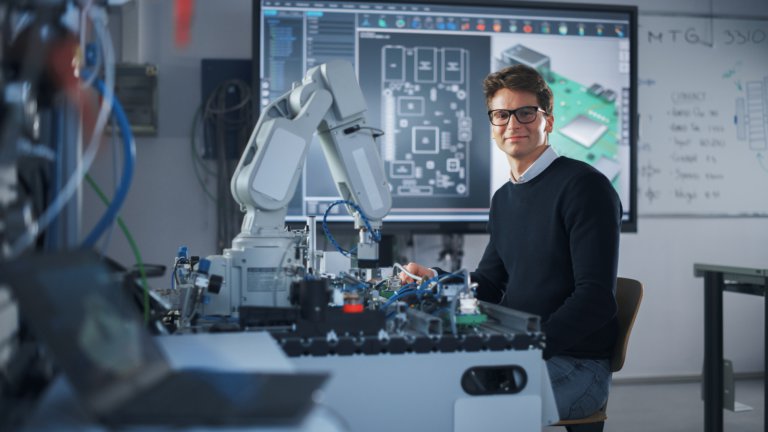
Imagine building the next generation of robots, designing cutting-edge prosthetics, or developing sustainable energy solutions. That’s the exciting reality of a career in mechanical engineering. As a mechanical engineer, you’ll be at the forefront of innovation, solving problems with creativity and tackling global challenges like climate change.
A mechanical engineering degree teaches you how to develop and use new materials and technologies and gain an understanding of mechanical engineering theory. Upon graduation, you’ll have the skills to work on medical, automotive, aerospace, renewable energy, marine and sports-related projects. Graduates can expect to work for private firms and government agencies, leading projects involving building, minerals, construction, power, manufacturing and processing.
In today’s competitive environment, hands-on experience is crucial. Employers are increasingly seeking candidates with practical experience. Here are three leading universities that bridge the gap between theory and practice, moulding graduates into highly sought-after professionals:
Purdue University
Purdue University’s College of Engineering’s vision is to be “the most consequential engineering college in the nation” — and it’s well on its way there. It hosts one of the top five engineering programmes in the US, with graduates going on to become astronauts, CEOs, entrepreneurs, researchers, and more. Their Purdue degree opens doors to almost any company or organisation, enabling them to carve successful careers and take on society’s grand challenges.
The college is home to the School of Mechanical Engineering which is moving the world forward by combining the latest technologies with the strongest of fundamentals. At its graduate school, you’ll master the skills necessary to innovate at nearly any field, from fuel pumps to heart pumps. Most of the credit for this goes to its graduate programme, ranked amongst the top 10 in the US.
For those looking to elevate their potential in the industry, pursue the Professional Master’s Programme (PMP) in Mechanical Engineering. This programme allows you to gain a world-class education in your chosen area in as little as one to two years, while refining your management skills and providing a robust foundation for a career path filled with precision and confidence.
You can tailor your education to your specific interests with dozens of specialisations, including heat transfer, fluid mechanics, solid mechanics, controls, design, nanotechnology, semiconductors, combustion, robotics, biomedical, and much more. The programme’s focus on soft skills development also equips you with the communication, leadership, and financial knowledge essential for success in today’s competitive job market.
Life at Purdue doesn’t stop at the classroom. You’ll enjoy the vibrant atmosphere of a large US university with a walkable campus and a diverse student body of over 50,000 students representing 135 countries. As the PMP is a qualified STEM programme, international students can apply for CPT/OPT employment opportunities in the US. Discover more opportunities that await at the School of Mechanical Engineering.
ETH Zürich
ETH Zürich needs no introduction when it comes to academic excellence. It is ranked seventh among the world’s top universities by the latest QS World University Rankings and sits at the 11th spot in the Times Higher Education (THE) World University Rankings 2024. A university that is primarily devoted to the sciences, it has produced 22 Nobel laureates among its alumni, including Albert Einstein himself.
Under the Engineering Sciences department, the institution has a Master in Mechanical Engineering that aims to prepare students for challenges at the frontiers of research and industrial development. This 1.5-year programme integrates core disciplines of mechanical engineering – such as mechanics, thermodynamics, fluid dynamics, materials and manufacturing science, control systems, and product development – with mathematics, computer science, physics, chemistry and biology.
This fusion creates a strong foundation for multidisciplinary fields such as robotics, micro and nanotechnologies, production systems, and energy systems. Here, students dig deep into the application of diverse tools, ranging from computer simulations to advanced experimental techniques, enabling them to gain a profound understanding of underlying phenomena and processes.
Beyond technical expertise, the programme emphasises the social impact of engineering. Students gain an understanding of the economic, organisational, and political contexts that shape the practice of mechanical engineering, preparing them to become responsible and ethical engineers who can create positive change in the world.
Imperial College London
Ranked third in Europe and sixth in the world (QS World University Rankings 2024), Imperial College London is held in high regard around thr world.
The Faculty of Engineering is home to the Department of Mechanical Engineering, it was ranked eighth in the world by the QS World University Rankings 2023. It has a rich history of teaching, research, and practice excellence, bringing together leading staff, exceptional students, and cutting-edge facilities to create an unparalleled learning environment.
The Advanced Mechanical Engineering (AME) MSc programme, offered by the department, is a prestigious programme with over 30 years of history. Limited to 40 selected students, the AME programme has a dynamic and challenging curriculum. Students benefit from personalised attention from world-leading experts and a diverse range of modules to choose from, allowing them to tailor their studies to their individual interests and future aspirations.
Research is an integral part of AME, with students undertaking a research project within one of the department’s many research groups, including Aerodynamics, Engine Technology, Mechatronics and Robotics, and Nanomaterials. This hands-on experience provides students with valuable research skills and prepares them for industry or further academic pursuits.
Maria Raposo De Lima, a current AME student, shares her positive experience: “This MSc has a dynamic and challenging taught component,” she says. “Being able to choose our combination of modules allows us to focus on the subjects in which we want to extend our expertise and to consider our career ambitions. Furthermore, there are clear links to industry, enterprise and many interesting group projects where we develop practical experience.”
*Some of the institutions featured in this article are commercial partners of Study International







